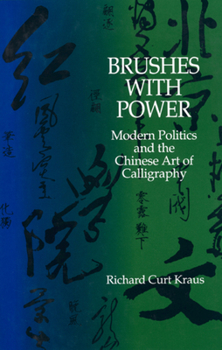Brushes with Power: Modern Politics and the Chinese Art of Calligraphy
Select Format
Select Condition 
Book Overview
Chinese calligraphy has traditionally been an emblem of the ruling class and its authority. After a century of mass revolution, what is the fate of this elite art? Richard Kraus explores the relationship beween politics and the art of writing in China today to explicate the complex relationship between tradition and modernity in Chinese culture. His study draws upon a wide range of sources, from political documents, memoirs, and interviews with Chinese intellectuals to art exhibitions and television melodramas. Mao Zedong and other Communist leaders gave calligraphy a revolutionary role, believing that their beloved art reflected the luster of authoritative words and deeds. Calligraphy was joined with new propagandistic mass media to become less a private art and more a public performance. It provided politically engaged citizens with subtle cues to changing power relationships in the People's Republic. Claiming neither that the Communists obliterated traditional culture nor that revolution failed to relieve the burden of China's past, this study subtly examines the changing uses of tradition in a modernizing society.
Format:Hardcover
Language:English
ISBN:0520072855
ISBN13:9780520072855
Release Date:July 1991
Publisher:University of California Press
Length:220 Pages
Weight:1.10 lbs.
Dimensions:0.9" x 6.3" x 9.3"
Related Subjects
Art Arts, Music & Photography Asia Calligraphy China History History & Criticism Other Media Performing ArtsCustomer Reviews
0 rating





